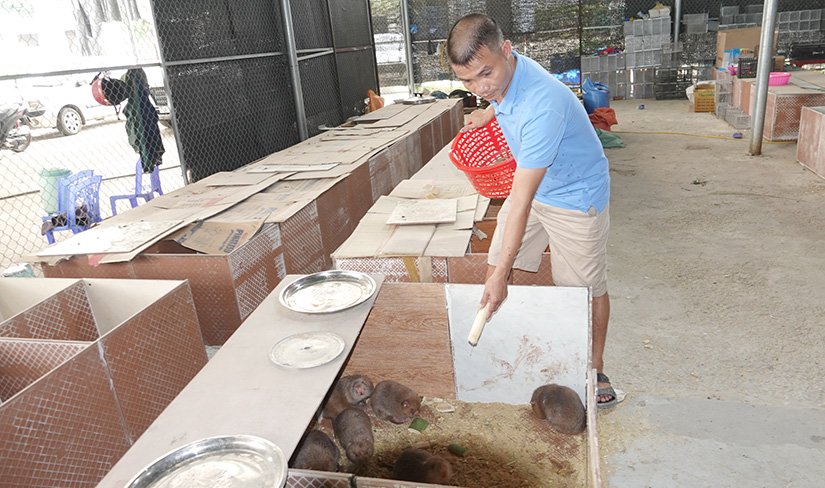
Mr. Do Van Dung caring for his family's bamboo rats.
Ten years ago, during a trip to Ha Giang Province, Mr. Dung saw local people exploiting bamboo rats in the forests to sale specialty food. Regarding to the gradual disappear of wild animals, he decided to domesticate wild animals to become popular animals by buying bamboo rat breed and raising them in his garden campus, cherishing the dream of his income improvement.
After many failed attempts at his bamboo rat farming model, he was determined to learn how to raise rodents. He built sheltered cages with ceramic tiled ground, and carefully chose food for bamboo rats. The food of the bamboo rats is mainly plants such as bamboo, sugar cane, corn. On average, it only takes him about VND200,000 to buy food for a bamboo rat per day.
From the first dozen of pairs of bamboo rat breed, Mr. Dung has raised and multiplied them with a total of thousands of rodents. Currently, his farm has nearly 8,000 bamboo rats, becoming the largest bamboo rat model in the North, bringing high economic efficiency.
From this model in Tan Trao Commune, Son Duong District, Mr. Dung's family and his relatives have contributed capital to expand 2 more large farm of raising bamboo rats and masked palm civets in Trung Yen Commune, creating jobs for nearly 20 local workers. The average monthly income of wage earners is estimated at VND8 - VND12 million. Therefore, many poor workers escaped poverty successfully.
Every year, his family sells 10 - 12 tonnes of bamboo rats and masked palm civets for restaurants and hotels both inside and outside the province, earning VND8 - VND10 billion.
On average, the selling price of bamboo rat meat is VND600,000 - VND650,000 per kg while the selling price of masked palm civet meat ranges from VND2 million to VND2.5 million per kg.
With the ownership of bamboo rat farms with an area from 2,000 m2 to 6,000 m2, his economic model also opens a new direction in the development of "specialty" trees and animals in the locality.

Comment
Print